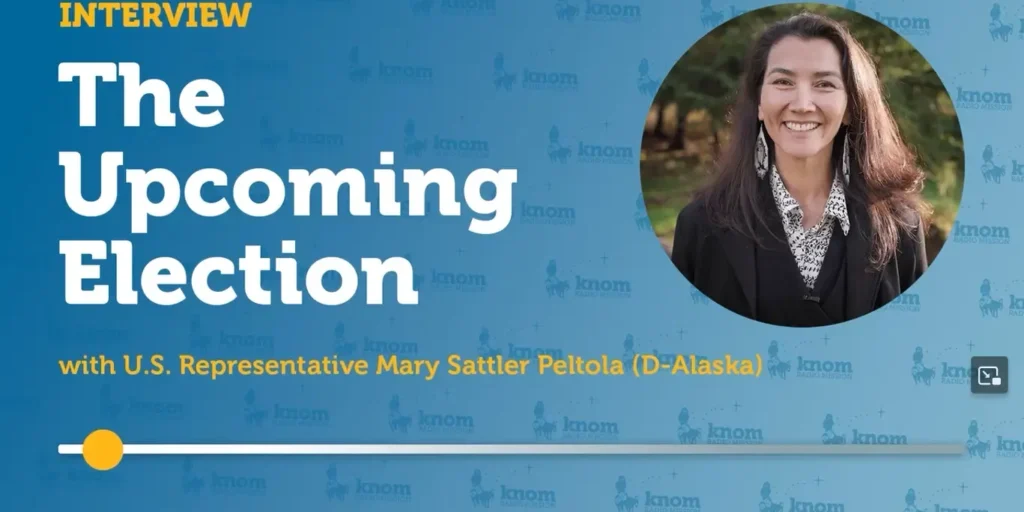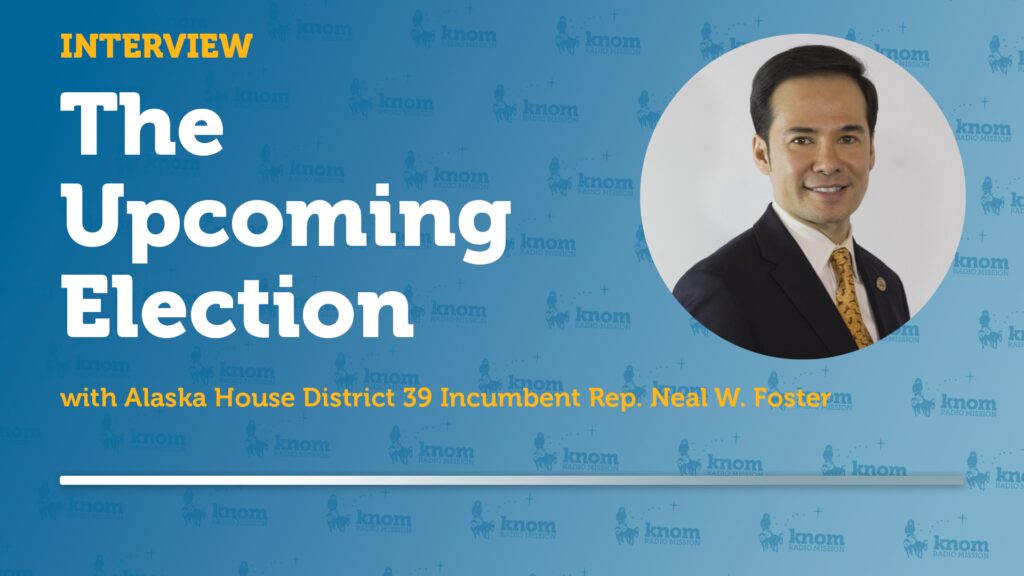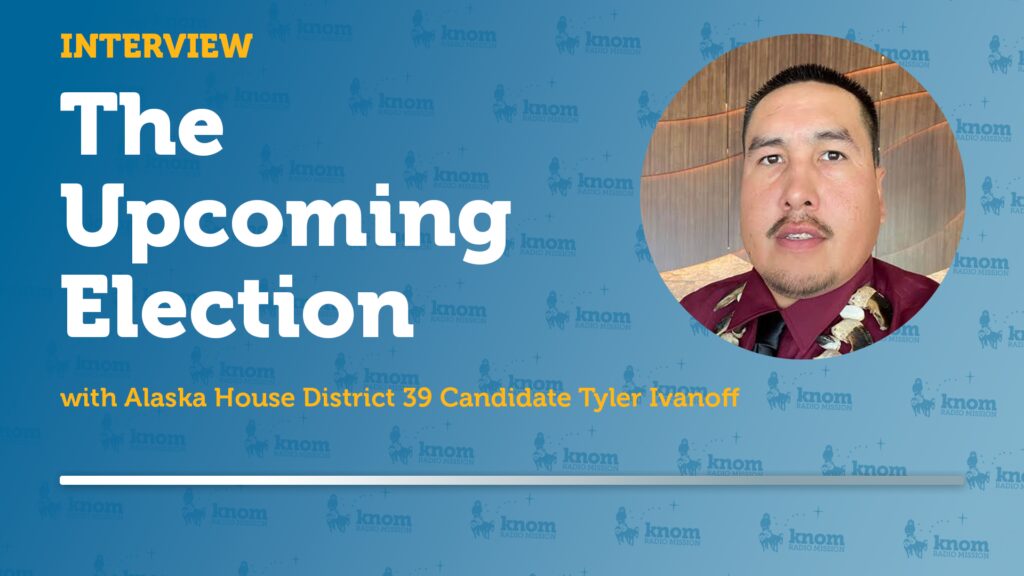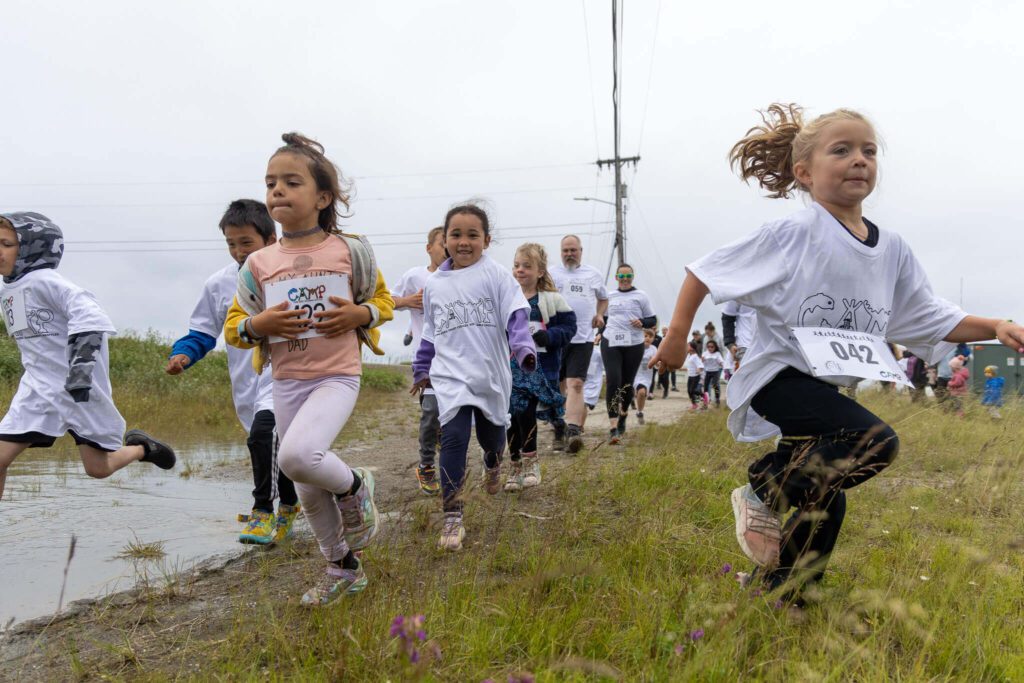Ben Townsend
Today we’re joined by US Representative Mary Peltola. She’s currently on the campaign trail as she seeks re-election this November. Mary, welcome back to KNOM.
Mary Peltola
Thank you, Ben. Good to be back.
Ben Townsend
Thank you. So I wanted to start by taking a look back at your time in Congress. If elected, this would be your second full term. When you reflect on your experience in DC, what was your experience like?
Mary Peltola
I feel very accomplished in such a short amount of time, after 30 years of trying to get Willow across the finish line, an oil field up in Prudhoe Bay that was stalled out and this administration was being very cagey as to whether or not they would allow the project to go forward at all. Or the other option was to minimize the project, to the point where it was not economic for the producer. So the Senators and I worked really hard to implore the President to allow Willow to go through and he did, and I paid it played a significant role in that three person effort.
I’m very proud that the group of folks that elected me, we’re all pro-Willow. We had all of the labor unions, I believe I’m the only statewide Alaskan elected person to have all unions behind me. We had native corporations, we had the oil industry behind the project. And that’s the coalition that elected me. So that was a campaign promise. And I delivered that within the first six months.
After that, I helped secure the $206.5 million appropriation for an energy grid Resilience Project along the rail belt. So this is the road system, and my hope is that eventually, once that has come to fruition, the rates of electricity for all Alaskans will go down through savings under power cost equalization. That award in itself was the largest renewable energy grant the federal government has ever awarded.
I felt very good about that, my commitment to renewable energy, and just an all of the above approach for Alaskans. I’ve been able to really elevate the fish issue in on the national scene. For a long time, it was a bit of a punchline; “fish, family, freedom” among journalists, national journalists, and certainly, many of my lower 48 colleagues.
I’ve been very direct in saying there’s nothing funny about fish in Alaska, no matter how young Alaskans are, or old, this is a really serious issue.
Ben Townsend
I was looking at my notes here, and I was looking at how that is the campaign slogan, that’s plastered across your website. So obviously, fish is really important not only to you, but to the communities that you serve. So it’s really great to see that put forward at the center.
I wanted to stay at the start of your career. You’ve experienced ranked choice voting firsthand, you won the 2022 election with the voting method that allows people to mark a candidate as their first, second, third, and so on choice. Some people have loved it. Some people not so much, going as far as suing to repeal the change just this spring. What are your thoughts on ranked choice voting now?
Mary Peltola
Well, I’m not a deeply partisan person. My personal identity isn’t through the filter of a political party. And I think I am very much like most Alaskans. 63% of Alaskans are independent, nonpartisan, or undeclared. And this allows that 63% of Alaskans to vote in a primary, the old system did not allow people to vote at the primary level.
I think that that element in itself is very helpful, because you’re not going through a primary on either side, where you’re trying to appeal to the extremes. So it really encourages moderates to be in the race, so that you can talk to everyone in your district that you’re going to represent.
And you know, the way politicians or politicos talk about it is the “universe of people”, you have to talk to all the “universes of people”. I’m really literal, so it took me a long time to understand that, but honestly, it requires candidates to talk to more than just the people they’re most comfortable with. And I think that it’s also really good for the electorate, or you know, the folks voting because hopefully they won’t have to hear so much negative campaigning because hopefully there will be incentive for candidates not to bash each other because you need other people’s second and third place votes to get ahead if you don’t have a clear 50% majority.
I really think it’s worth noting that what we saw in the last election cycle is the most conservative governor in the United States elected, a moderate US senator, and a moderate US House member. Alaskans had to have voted across the party spectrum to come up with these three people winning. But the only person to get over 50% was [Governor] Mike Dunleavey. And again, he’s very conservative. So it shows that it’s not any kind of conspiracy, except more participation among people who aren’t affiliated with a party.
Ben Townsend
And I think that that segues us really well into the next thing I wanted to ask you about. I was talking to somebody before our interview, and I mentioned that I was gonna get to speak with you. And they asked me, “What is she again?” They were asking me, “Are you a Democrat or Republican?” You’re a registered Democrat, but I think your track record shows that you blur that line quite a bit.
Alaska Public Media reported earlier this year that your vote against party rate is more than 12%. I should note, that’s the fourth highest among House Democrats and more than double the democratic average. So can you explain how you define your party affiliation right now?
Mary Peltola
Again, I just don’t see things through a partisan lens. And I think that it’s really important for whoever is representing Alaska to also be conscientious about that 63% of voters who are nonpartisan, undeclared, or independent.
So many of the issues that we face as Alaskans and as Americans are not partisan issues; the National Defense Authorization Act, the Federal Aviation reauthorization, the farm bill, that hopefully will pass soon, homelessness issues, and the cost of housing, the cost of energy, education, roads, public safety, all the things that we care about the most aren’t partisan issues.
It’s really unfortunate that it’s become such a hostile and angry exercise to be in politics. When I was in the legislature starting out 26 years ago, and then I left 16 years ago and took a 14 year hiatus, boy did the world change. You know, when I was first in politics in Juneau, it was very bipartisan. And actually, when I worked with the Bush Caucus, we were five Democrats and five Republicans and aligned on almost everything.
I really think that as Alaskans, we need to be embracing that. And the legislature really reflects that they have a tripartisan House and a tripartisan Senate. And I think we really are leading by example for the rest of the nation that we have to work together.
Ben Townsend
I think you alluded to it earlier, one of the issues that you tend to differ from some Democrats is energy development, resource extraction. I’d be remiss if I didn’t ask you about Ambler Road.
Just recently, the Biden Harris administration moved to block the Ambler Road project. The road would’ve been a critical artery for a number of mining projects in the north. You teamed up with Senators Lisa Murkowski and Dan Sullivan, I believe yesterday, to condemn the move in a press release. So why would you say that you’re in favor of this project moving forward?
Mary Peltola
I’m really glad you asked about this, Ben, because I actually did not approve my name being on that press release. I was traveling, I had been in Naknek for a bit and then Kotzebue yesterday, here in Nome today. I don’t think Senator Murkowski had signed off on that either.
We do typically work as a team, I think our delegation works better than any other delegation, certainly better than any other bipartisan delegation. But we’re not in alignment on every single thing.
I really have heard a lot of new developments coming from the region on Ambler and the Ambler Road. NANA has taken a step back and said, “We’ve asked the proponents for six assurances, we’ve asked ADA for six assurances we can’t get one,” and that is pause for concern.
I do want to listen to the people of the region. I think it is still a controversial project. And even if I was all in, I don’t think we’re at that point. I think that this project really has hit a pause button so that we can learn more about it. And there’s more time for the proponents to have outreach with the stakeholders.
Ben Townsend
This is dating back to 1980. Right, ANILCA, the Alaska National Interest Lands Conservation Act. A lot of that press release was sort of based on this foundation that was established in 1980. I wanted to bring up that in 1980 our understanding of the environment was a lot different than it is now. And in that press release, they mentioned that we’re trying to balance conservation and responsible resource development. Where does Ambler Road fit into that spectrum?
Mary Peltola
That is a question that I think the people who live here are really trying to weigh, is the level of risk worth having the project there? And the real concern is this road, if it’s a publicly funded road, I don’t believe it can be a private road, if the companies are willing to invest in the private road to keep it private. And that might be a different conversation.
But in talking with people in Kotzebue, yesterday, it didn’t even sound like they’re open to that. I think there’s just a lot of misgiving and concern about having a road road access to resources that are already very limited. There’s already a lot of frustration and concern over this small size of the caribou herd and access to the caribou that they need. So it’s an ongoing conversation.
I think it’s really important for me as the one representative for Alaska to listen closely to the people who live near these projects.
Ben Townsend
I appreciate your perspective on that. And great insight that this is something that is developing as we speak here.
You ask anybody domestic or even abroad, this is a really consequential election year in the United States. And as you’ve seen, a President can only be as effective as their Congress. And you can say it the other way around, as well.
I also want to throw in a Supreme Court with a conservative majority, making decisions that are entirely reshaping the executive branch are also further complicating things. So what’s your assessment of the political landscape right now? And what could you realistically hope to accomplish in a second term?
Mary Peltola
So it has been a very challenging Congress. The 117th Congress was very productive, a lot of growth and forward progress really took place in terms of generational packages, generational investments, and Alaska, really has made out very well with those. And we continue to make out well, and my office has hired a grant writer to work with communities and entities to make sure that we’re being competitive in Alaska, because no one is more deserving of federal infrastructure growth dollars than Alaska is where we’re 150 years behind most places in the lower 48.
In terms of infrastructure, a lot of our infrastructure is old. We’re enormous in size. If we were a standalone country, we’d be the 18th largest country in the world, we have a giant footprint, it’s very hard to build things here. And the environment is very challenging, and takes its toll on our infrastructure.
So, talking about present day 118th Congress, it’s been very challenging. We went through an exercise where we were without a house speaker for three weeks, which we learned the hard way, grinds everything to a total halt. We were deadlocked, and just kind of waiting. And I’m not part of their conference, so I was just waiting with everyone else to see what would happen.
I’m proud in many ways that I was a vote to table the motion to vacate Mike Johnson as speaker because we would have been in the same place and Alaska, the Nome region, every one of our rural regions, we have a real partnership with the federal government, we rely on the federal government, so much of so many of our places are on federal land, we need to have access to the federal managers, we need to have access to federal programs. It’s hard to buy a home when we’re in the middle of a federal shutdown.
It’s important to me that we have a government where we can keep the lights on, we’re paying our debt. You know, this isn’t even aspirational. But this Congress has been such a F or incomplete that it’s been really hard to get things done.
I am much more hopeful for the 119th. Congress because pundits are predicting that the House side will be Democratic and the Senate side will be Republican. If that is the case, and I am able to go back and represent Alaska in DC in the 119th Congress, Alaska will be very well positioned because we’ll have members in the majority on both sides.
And then whoever wins the presidency, we will also have a good relationship with that person because Dan Sullivan works really well with Republicans and Donald Trump. I’ve worked really well with Joe Biden, and Lisa- she’s very much in the middle and is a real player in DC so whichever way this election goes, Alaska will be well positioned to represent our needs.
Ben Townsend
In closing, I traveled to Stebbins last week to report on a fire that destroyed their school and several other buildings. There I saw devastation, but I also saw beauty in the way that the village was responding to that. So as we wrap up here, I wanted to ask you for some words of support for the community of Stebbins.
Mary Peltola
My best friend Mary Pete was from Stebbins, she passed away in 2018. But I think she really epitomize the resiliency, and just this high achieving nature. And I know that people in Stebbins are very resilient and we’ll get through this. Many small communities have seen instances where there have been really big challenges, you know, one right after another, but we’re resilient people, our ancestors have given us a lot of tools to stay positive, and keep thinking about the future.
We really need to make sure that we’ve got food security and good education for the children of Stebbins, we need to make sure that elders are being taken care of. And I’m confident, one of the things that I’ve heard is that their City Administrator, I believe it is, is just outstanding, and she’s a real go-getter. After FEMA [Typhoon Merbok] she worked to get 10 new houses that are being constructed. I think they have 15 more that have black mold issues, and I’m looking forward to working with her on that.
I think she is an outstanding leader. And I think everyone in Stebbins is going to really pull through this and show us how to get it done.
Ben Townsend
You just heard from Mary Peltola, our US Representative for Alaska. Mary, thank you so much for joining us.
Mary Peltola
Thanks, Ben.







